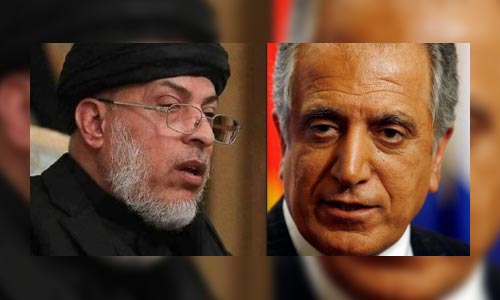The Taliban and US envoy seem to have made little headway in peace talks in Qatar as the US officials agree to troop pullout from Afghanistan. But militancy looms large in the country as the Taliban continue their attacks unabated.
Contrary to the preliminary consensus, the two sides will haggle more in the next round of peace talks to extend their agreement. What is worrying is that despite holding a series of talks, the Taliban have not been persuaded to decrease their insurgency against Kabul government. That is, on the one hand, the Taliban come to the table, and on the other hand, they spill streams of Afghan soldiers and civilians’ blood, which makes Afghans lose their confidence in the talks.
There will be a major change in Afghanistan as a result of the upcoming presidential election and the ongoing peace talks between US envoy Zalmay Khalilzad and the Taliban.
Afghan political heavyweights including President Ghani and CEO Abdullah Abdullah have designed their teams to run for presidency. The upcoming presidential election is likely to be a highly tough competition between political rivals. It is feared that electoral fraud, which is unavoidable in the country, will trigger tension between the candidates similar to that of 2014 presidential election which led to the formation of National Unity Government.
The Taliban yet to clear their stance regarding the election. If the Taliban and US envoy reach a consensus on ending the conflict in Afghanistan, the Taliban will seek to have a stake in the next government. What if the Taliban persist on establishing an Islamic Emirate, in which there is no room for election?
The return of Sharia claimed by the Taliban and respecting Afghan Constitution urged by Kabul government are the two contradictory demands which have to be haggled over at the negotiating table. “The most difficult challenge could be ‘to abide by Afghan Constitution’ and ‘the return of Shariat,’ a pair of conflicting demands determining the future framework of Afghan politics and being directly interlinked with political position and prospects of each side,” said Dr. Zeng Xiangyu, a scholar at Institute of South Asian Studies in Sichuan University. “Kabul would hardly quit its mostly secular and modernization-oriented Constitution, as it is of vital importance for its own survival. Taliban in turn could ill-afford quitting the ‘return of Shariat,’ a ‘divine’ objective it has struggled for years, because this could be a price unbearable for itself considering the possible lost of popularity among conservative forces, and the nightmare scenario of disbandment of itself.”
President Ghani has also said in Davos that the truce should be based on Afghan Constitution and legal framework. He further said that Khalilzad is tasked to organize talks between the Taliban and Kabul government. It is believed that the Taliban will be convinced to sit around the peace table with Afghan government, however, reaching a consensus between the two sides will be time-consuming since the government is supposed to take the public demands into consideration.
Since many regional powers have leverage on the Taliban, it is believed the Taliban will extend their demands and haggle over at the table. The regional powers, who are organizing the talks, will have a stake in the negotiations if they come to fruition. In such a case, reaching a unanimous agreement between the Taliban and their interlocutors will be a long and time-consuming process. However, the Taliban are advised to end this conflict sooner so as to sustain less casualties. To put it in a nutshell, reaching a consensus earlier will result in lower price.
Holding talks with false intention and continuing a foul game at the table is tantamount to playing with fire. The Taliban have to stop wasting time and make an agreement with their interlocutors in the legal framework so as to not miss this chance, especially as Kabul is prepared to give them a share in the government. For example, Gulbuddin Hekmatyar, the head of Hezb-e-Islami who signed a peace deal with Afghan government, is running for the presidential election. If the Taliban sign a peace pact with Kabul, their members will, similar to Gulbuddin, be able to run for presidential or parliamentary elections. Meanwhile, they will be treated as normal citizens enjoying all the advantages.
All in all, bargaining too much at the table will not only waste the time but also hinder the peace process. Thus, the Taliban have to exercise a bona fide intention in this regard and sign a deal with their interlocutors before the election.
Home » Opinion » Political Haggling Continues at the Table
Political Haggling Continues at the Table
| Hujjatullah Zia

